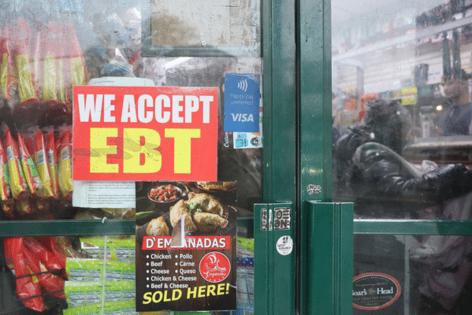Commentary: Even with SNAP, workers face food crisis
Published in Op Eds
Although the longest federal government shutdown in our nation’s history has formally ended, and payments to the one in eight U.S. residents who rely on the federal Supplemental Nutrition Assistance Program (SNAP) have resumed, the problem of hunger in America remains unsolved.
Kids are still going hungry, inflation is out of control and the food-assistance policies that Americans overwhelmingly back have been tossed aside in favor of cold-blooded partisan maneuvering.
Unfortunately, we have learned this hard lesson at least once before. During the slow and anemic government response to the COVID-19 pandemic, the organization I head, One Fair Wage, launched an emergency relief fund that quickly raised $23 million in emergency aid to restaurant and gig workers who suddenly lost income.
Now, One Fair Wage and other groups are stepping up again to fill the gap left by our legislators and big business. We’ve reopened our emergency fund for service workers as a short-term fix for a crisis that never should have happened.
Despite re-opening, the federal government is neglecting its legal and moral responsibility to American workers and families by failing to fully fund the SNAP program. We are living in an affordability crisis created by the leaders who swore to protect us, and by business groups such as the powerful corporate lobby National Restaurant Association, which continues to block efforts to raise the minimum wage.
Politicians are churning out rhetoric about how food stamp recipients must learn to make their own way without government support. “Bottom line, the well has run dry,” the Department of Agriculture stated in a memo posted on its website. But the fact that more than 22 million households in this country rely on food stamps can be chalked up to poverty wages, not irresponsible individuals. About 70% of people who receive food stamps already work full-time, but are paid wages so low they still need assistance to survive.
Research shows that service workers rely on public aid at twice the rate of other workers, a reflection of poverty wages across the industry. That’s because restaurant workers are some of the lowest-paid workers in the United States — largely due to the subminimum wage for tipped workers, a policy created and maintained by elected officials of both parties who defer to the whims of the National Restaurant Association.
The wage crisis in restaurants is also a racial justice crisis — people of color make up 53% of all restaurant workers on SNAP. This is a system designed to depend on widespread underpaid labor from workers of color. The hardworking people who feed us at restaurants and through our delivery apps can’t consistently get the food they need to survive.
Today, restaurant and service workers who rely on SNAP and have experienced food insecurity due to benefit reductions can get support from community-driven efforts. This can include direct cash assistance for groceries and basic needs, access to food resource partners and local relief efforts, and tools and information to organize for higher wages.
But the only way these types of funds work is through mutual support. If you don’t need help right now, you can step up and help your neighbors and community by donating, volunteering or spreading the word. This is how it worked at the onset of COVID-19 and it’s how it needs to work today.
We are in a moment of crisis, but the answer can’t stop at survival. The fight must also ensure this never happens again. People are going hungry not because they don’t work, but because they’re paid poverty wages. The real solution must come from state governments — especially blue states — leading by example.
Elected leaders who claim to stand with working people have a responsibility to prove it. They must listen to workers, not trade lobbyists, and pass laws to ensure a living wage for all with no exceptions, including for tipped workers, to ensure that no one who works for a living ever has to depend on food stamps to eat. That’s how we address the root cause of this crisis, and make sure working people are never left hungry or turned into political bargaining chips again.
_____
Saru Jayaraman is president of One Fair Wage and director of the Food Labor Research Center at University of California, Berkeley. This column was produced for Progressive Perspectives, a project of The Progressive magazine, and distributed by Tribune News Service.
_____
©2025 Tribune Content Agency, LLC.
























































Comments